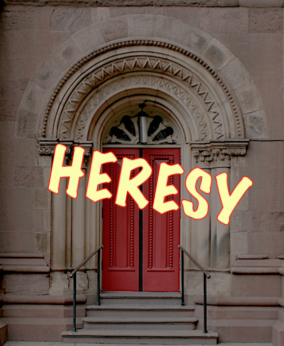 Heresy is a false teaching about the essential doctrines of our faith – the ones we must adhere to, regarding who God is, who Jesus is, salvation by grace, and Jesus’ resurrection. Non-essential beliefs are certainly worth discussing with passion (and love of course), but not to the point where those who hold opposite non-essential beliefs are considered heretical. It is also important to remember that sanctification (our growth in holiness, truth, and wisdom), often is on a different timeline from other brothers and sisters in Christ.
Heresy is a false teaching about the essential doctrines of our faith – the ones we must adhere to, regarding who God is, who Jesus is, salvation by grace, and Jesus’ resurrection. Non-essential beliefs are certainly worth discussing with passion (and love of course), but not to the point where those who hold opposite non-essential beliefs are considered heretical. It is also important to remember that sanctification (our growth in holiness, truth, and wisdom), often is on a different timeline from other brothers and sisters in Christ.
So what constitutes a heresy? There’s no better resource than what CARM (Christian Apologetics & Resource Ministry) has put together on the subject. At the bottom of this article is a list of heresies determined by church councils throughout the centuries, with links and explanations:
- “Heresy is a belief or idea that is in contradiction to orthodoxy. In the context of Christianity, heresy is that which deviates from standard biblical teaching. Examples of heresy would be polytheism, a denial of the resurrection of Christ, a teaching that salvation is obtained by works, etc. The Christian church has experienced many attacks by heretics throughout the centuries, but it has fought them successfully – even though many persist. There are modern-day heresies. For example, Mormonism which teaches God is an exalted man from another planet and that we can become gods. The Jehovah’s Witnesses deny the Trinity, deny the deity of Christ, and deny salvation by grace alone through faith alone. Roman Catholicism also promotes a works-based salvation and Mary worship.
“Error, indeed, is never set forth in its naked deformity, lest, being thus exposed, it should at once be detected. But it is craftily decked out in on attractive dress, so as, by its outward form, to make it appear to the inexperienced (ridiculous as the expression may seem) more true than truth itself,” (Irenaeus Against Heresies 1.2).
The word “heresy” comes from the Greek ‘hairesis’ which means “choosing” or “faction.” At first, the term heresy did not carry the negative meaning it does now. But, as the early church grew in its scope and influence throughout the Mediterranean area, various teachers proposed controversial ideas about Christ, God, salvation, and other biblical themes. It became necessary for the church to determine what was and was not true according to the Bible. For example, Arius of Alexandar (A.D. 320 ) taught that Jesus was a creation. Was this true? Was this important? Other errors arose. The Docetists taught that Jesus wasn’t human. The Modalists denied the Trinity. The Gnostics denied the incarnation of Christ. Out of necessity, the church was forced to deal with these heresies by proclaiming orthodoxy; and in so doing, condemnation upon these heresies and the heretics became a reality.
Unfortunately, some of those who attempted to defend and establish the truth did so by killing those who disagreed with them. What would prompt such hostile actions against those who merely had “differences of opinion” on biblical subjects? The answer may not ever be fully known, but I offer this explanation.
Culturally, when Christianity arose, it arose in the midst of a hostile environment. Judaism and the Roman Empire both warred against its people and its teaching. Persecutions arose and Christians were killed for their faith. In the Diaspora (dispersion) of the late first century, Christians were scattered throughout the Mediterranean area due to the persecutions in Israel. The Roman Empire with its theology of many gods was not friendly to Christianity’s monotheism. Therefore, Christians were further persecuted.
Theologically, the Bible teaches condemnation upon false doctrines and false teachers. Gal. 1:8-9 says, “But even though we, or an angel from heaven, should preach to you a gospel contrary to that which we have preached to you, let him be accursed. 9 As we have said before, so I say again now, if any man is preaching to you a gospel contrary to that which you received, let him be accursed.” (See also 1 Cor. 16:22; 2 Cor. 11:13-15; 1 Tim. 1:18-20; Titus 3:10) Why is this taught in the Bible? The reason is simple. Christians are saved by faith in the work of Jesus on the cross, but faith in itself is not enough. Faith is not a substance you can put in a jar. It is belief in something. Faith is only as good as who it is placed in. If you put your faith in a false God, you are lost because a false god cannot save anyone. This is why God says in Exodus 20:3, “You shall have no other gods before Me.” Faith is not what saves, but faith in the true God is what saves. (read more here on What is heresy?)
Heresies
- Adoptionism – God granted Jesus powers and then adopted him as a Son.
- Albigenses – Reincarnation and two gods: one good and other evil.
- Apollinarianism – Jesus’ divine will overshadowed and replaced the human.
- Arianism – Jesus was a lesser, created being.
- Docetism – Jesus was divine but only seemed to be human.
- Donatism – Validity of sacraments depends on character of the minister.
- Eutychianism – Jesus finite human nature is swallowed up in His infinite divine nature.
- Gnosticism – Dualism of good and bad and special knowledge for salvation.
- Kenosis – Jesus gave up some divine attributes while on earth.
- Marcionism – An evil God of the O.T., good God of the N.T. 11, books in the Canon
- Modalism – God is one person in three modes.
- Monarchianism – God is one person.
- Monophysitism – Jesus had only one nature: divine.
- Nestorianism – Jesus was two persons.
- Patripassionism – The Father suffered on the cross.
- Pelagianism – Man is unaffected by the fall and can keep all of God’s laws.
- Semi-Pelagianism – Man and God cooperate to achieve man’s salvation.
- Socinianism – Denial of the Trinity. Jesus is a deified man.
- Subordinationism – The Son is lesser than the Father in essence and or attributes.
- Tritheism – The Trinity is really three separate gods.



A huge AMEN!! to that Amy. And cudos to CARM’s Mat Slick for an excellent article.
Blessings:-}
Where did you get your information from that the Albigenses were heretical? This would be the position the Roman church adopted concerning them but there is evidence to suggest they were simple believers with, no doubt, some errors. The Pilgrim Church by E H Broadbent gives much useful information about them.
Vince.
From CARM,
“Albigenses was a heresy during the middle ages that developed in the town Albi in Southern France. This error taught that there were two gods: the good god of light usually referred to as Jesus in the New Testament and the god of darkness and evil usually associated with Satan and the “God of the Old Testament.” Anything material was considered evil including the body which was created by Satan. The soul, created by the good god, was imprisoned in the evil flesh; and salvation was possible only through holy living and doing good works. At death, if the person has been spiritual enough, salvation comes to the believer; but, if the person has not been good enough, he is reincarnated as an animal or another human. The Albigenses denied the resurrection of the body since it was considered evil.
The Albigenses taught that Jesus was God, but that He only appeared as a man while on earth. It also taught that the Catholic church of the time was corrupted by its power and wealth. Their asceticism and humility compared to the great affluence of the clergy helped to bring many converts to this evangelistic movement.
There were two types of Albigenses: believers and Perfects. Believers were Albigenses who had not taken the initiation rite of being a Perfect. Perfects denounced all material possession. They abstained from meat, milk, cheese, eggs, and sexual relations. To become a Perfect, a believer had to go through consolamentum, an initiation rite involving the laying on of hands that was supposed to bring the baptism of the Holy Spirit. Infrequently, suicide was practiced as a way to rid oneself of the evil human body.
In 1208, Peter de Castelnau, an official representative of the Pope, was murdered by an Albigenses. Since they had been growing in number, becoming a threat, and would not convert to Christianity, Pope Innocent III ordered them to be wiped out. The persecution was fierce, and the movement was stopped.”
From Wiki,
“Catharism had its roots in the Paulician movement in Armenia and eastern Byzantine Anatolia and the Bogomils of the First Bulgarian Empire,[6] who were influenced by the Paulicians resettled in Thrace (Philipopolis) by the Byzantines. Though the term “Cathar” (/ˈkæθɑːr/) has been used for centuries to identify the movement, whether the movement identified itself with this name is debatable.[7] In Cathar texts, the terms “Good Men” (Bons Hommes) or “Good Christians” are the common terms of self-identification.[8] The idea of two Gods or principles, one being good and the other evil, was central to Cathar beliefs. The good God was the God of the New Testament and the creator of the spiritual realm, contrasted with the evil Old Testament God—the creator of the physical world whom many Cathars, and particularly their persecutors, identified as Satan. All visible matter, including the human body, was created by this evil god; matter was therefore tainted with sin. This was the antithesis to the monotheistic Catholic Church, whose fundamental principle was that there was only one God, who created all things visible and invisible.[9] Cathars thought human spirits were the genderless spirits of angels trapped within the physical creation of the evil god, cursed to be reincarnated until the Cathar faithful achieved salvation through a ritual called the consolamentum.[10]”
Albigenses were also known as Cathars. Apostate, dualists, ascetic, works oriented, it was a cult.
This is what they believed and taught:
“Consolamentum, known as heretication to its Christian opponents, was the unique sacrament of the Cathars.[1] In common with Christianity, Cathars believed in original sin, and—like Gnostics—believed temporal pleasure to be sinful or unwise. The process of living thus inevitably incurred “regret” that required “consolation to move nearer to God or to approach heaven. It occurred only twice in a lifetime: upon confirmation in the faith and upon impending death. It was available to both men and women who made a commitment to the faith.[2] Following the ceremony the consoled individual became a “Cathar Perfect”.
According to the Albigenses and other Cathars, the consolamentum was an immersion (or baptism) in the Holy Spirit. It implied reception of all spiritual gifts including absolution from sin, spiritual regeneration, and the power to preach and elevation to a higher plane of perfection.[1]”
“Reference to the trinity was systematically replaced with the name of Christ since the doctrine of the Albigenses and Cathars professed a single unified deity (their Christology resembled modalistic monarchism in the West and adoptionism in the East).
The ritual took various forms; some used the entire New Testament scripture whilst others relied on extracts such as the Gospel attributed to John while administering consolation. There were reportedly some remote cases where holy water was used as a cleansing agent during consolamentum being profusely poured over the recipient’s head until he/she was completely wet (as opposed to sprinkling).[1]”
I would say more than errors, they were cultic and utterly apostate.
Thank you Manny1962 for those posts about the cathars. The thing I find hypocritical about the “church” of the day, RCC, Is that the way they believed they were supposed to deal with heresy was to torture and murder it’s adherents. And being a cult themselves, were able to get away with it just because they were in the majority, while not suffering the same fate. Something I believe that will happen again in the not too distant future to those who find themselves in the Time of Jacob’s Trouble.
Blessings:-} brother
There is evidence that the Albigenses were simply Christians that were ruthlessly butchered by the “Church” aka RCC.
https://jesus.org.uk/sites/default/files/media/documents/books/others/the-pilgrim-church.pdf
Beginning at page 99
And
https://www.thebereancall.org/content/december-1994-q-and-a-3
Yes because they did not acnowledge the papacy nor the RCC authority: this is from a Catholic site…….
http://www.newadvent.org/cathen/01267e.htm
Q,
What they were really guilty of, whether they were heretics or not, was the fact that they would not bow to the pope. In those days that was enough to warrant torture and murder.
Blessings:-}
Nonetheless their practices and beliefs were not biblical……….
“The idea of two Gods or principles, one being good and the other evil, was central to Cathar beliefs. The good God was the God of the New Testament and the creator of the spiritual realm, contrasted with the evil Old Testament God—the creator of the physical world whom many Cathars, and particularly their persecutors, identified as Satan. All visible matter, including the human body, was created by this evil god; matter was therefore tainted with sin. This was the antithesis to the monotheistic Catholic Church, whose fundamental principle was that there was only one God, who created all things visible and invisible.”
If that’s not heresy, I don’t know what is.
I agree the beliefs attributed to the Albigenses is heresy but it is not something the Albigenses taught or practiced. It is revisionist history made up by those (the RCC) who slaughtered them as an excuse for what they had done to them. If the German’s had won World War ll we would be told the holocaust never happened…,some still do make this claim, and who knows what other revisions would have been made. History like spoils belongs to the victors.
“The Germans destroyed most documentation that did exist before the end of the war. The documents that survived and related directly to the killing program were virtually all classified and stamped “Geheime Reichssache” (Top Secret), requiring special handling and destruction to prevent capture by the enemy.”
Holocaust Encyclopedia
I can not take the RCC word on what the people they slaughtered believed.
What is at stake is whether or not there were true bible believing Christians through out the 2000 year history or are all Christians from the line of the Roman Catholic Church?!? or the Orthodox Church? as some would like us to believe.
Is the RCC the true Church? Was true Christianity lost for a while until the reformation (Reformed Catholic Church) or did God always have a remnant of bible believing people that would not capitulate to the RCC even when threatened by the most horrible deaths?
There is evidence the Albigenses were among the remnant and many of their writings and evidence which prove it were destroyed by those who murdered them but not all of their writings or evidence.
Amen to that Q. The RCC and their adherents wrote what they wanted posterity to believe. And it is quite possible that these Cathars, as they are known, were smeared by the RCC to justify their murders and tortures.
Blessings:-}
Thanks Edwitness, blessings to you too.
Yep…the Albigenses infuriated the wicked monk Dominic, since they answered his queries re RCC positions with actual scripture. In response,Dominic initiated the murderous inquisition.
The Albigenses and the Waldensians were the ones who preserved the Textus Receiptus following the brutal Diocletian persecution, and for centuries thereafter, and thus, they are hated and slandered. The RCC wants us not to have Bibles, but if we do have one, to have one that uses a Greek manuscript hat affirms catholic doctrine aka all of the new versions.
Thank you so much for that Sola S.
I was suspicious of that negative info about the Cathars seeing how it is sponsored by RCC but did not have the evidence to support it. Q’s reference to Berean Call with Dave Hunt was a no brainier. I don’t know why I didn’t think to go there. He was always such a great defender of the faith against the RCC lies.
Blessings:-}
The RCC is still pushing written history their way. And I’m convinced she is the harlot that rides he beast. Is it not wonderful how scripture describes the true church as a bride, but man’s greatest religious contraption a whore? Poetic justice! We need to pray for the poor souls caught in the web of lies and deceit. Given all the other things happening in society, economics, politics and ecological sphere we must hurry about ourmaster’s work and evangelize as many as we can, warn and exhort because the days are getting short and darker.
God bless you all! Q, Ed, Sola, keep up the good fight, the Good Lord knows we are headed for trouble!
I did find this:
http://www.cathar.info/cathar_catholic.htm
When determining heresy one must ensure that rejection is based on true representation of the belief system, often times a belief is misrepresented, then claimed heretical. For example, If one claims that official teaching of the Catholic Church is “to worship Mary,” then one can claim it’s heretical. However, the Catholic Church has no official doctrine that says one is to worship Mary. In fact, only the GODHEAD is to be worshiped. People constantly misrepresent teaching due to lack of research, study, discernment from the HOLY SPIRIT and prayer.